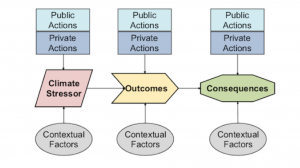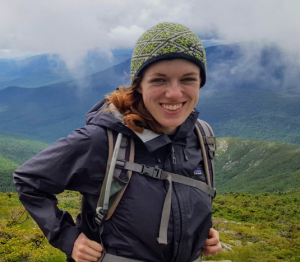
By Zoë McAlear for EDRBlog.org
In July, I spent two days in Moab, Utah to help facilitate a workshop on how the impacts of climate change on drought and extreme precipitation may affect water supply management in the Spanish Valley. The workshop, which was organized by Western Water Assessment (WWA) with facilitation help from the Environmental Dispute Resolution (EDR) Program, brought together representatives from the region’s three water supply providers, as well as other related stakeholders. Community leaders themselves identified the 15 invitees for the workshop. The workshop engaged participants in a facilitated dialogue process called Vulnerability, Consequences, and Adaptation Planning Scenarios (VCAPS). Through the VCAPS process, regional stakeholders explored potential outcomes and consequences of climate change in their area, while building relationships with each other and collaboratively identifying actions and strategies that could help them respond to potential changes.
The workshop in Moab was part of a WWA initiative to pilot the use of the VCAPS process in the Mountain West. WWA is an applied research program based at the University of Colorado Boulder, with a goal of making climate science more usable for decision-makers and communities. In line with this goal, the VCAPS process has helped WWA to build relationships with communities, identify their concerns and information needs, provide locally-relevant knowledge about how climate change might affect them, and build their resilience.
VCAPS was developed as a joint project of the Social and Environmental Research Institute and the Carolinas Integrated Sciences and Assessments Program. According to the project’s website, VCAPS was tested and refined in 2011 in two South Carolina coastal communities. From there, it has been applied in Alabama, Maine, Massachusetts, North Carolina, and South Carolina (before the most recent WWA-directed workshops in Colorado and Utah). The creators of VCAPS explain the purpose of the process in this way:
“[VCAPS] is intended to help communities become more resilient to weather and climate change. During VCAPS, community members: engage in dialogue about future weather and climate threats; summarize and integrate local knowledge and experience about how the community will be impacted; identify gaps in data, knowledge, or understanding; and think strategically about how to prevent harm by taking action in both the short- and long-term.”
The process works to accomplish these outcomes through two main components: a presentation from a climate scientist on up-to-date local observations, climate change projections, and potential outcomes; and a diagramming exercise and discussion. The VCAPS diagramming exercise walks participants through the process of mapping out the causal structure of a hazardous event. The conversation begins with a management concern (i.e., reduced water supply) and climate stressor (i.e., increased temperature), and then works to identify the physical and social outcomes and consequences that stem from each climate stressor. In addition, the facilitator is listening for contextual factors, or the factors that are unique to the region’s context that influence its ability to cope with a particular outcome or consequence. Once the causal structure is complete, the group then begins a discussion of potential actions that the region could take to address the different outcomes and consequences.
Get notified when new articles are posted to the EDR blog – sign up for our email list »
After taking part in the VCAPS workshop in Moab as part of the facilitation team and reading about previous workshops, I see three main important outcomes from the use of this process:
- Connects different kinds of knowledge: By bringing together local stakeholders with a wide variety of expertise, and having a climate scientist present locally-relevant climate information, the workshop connects different knowledge bases. The outcome of the VCAPS workshops – the diagrammed causal structure – is benefitted by this range of information, building off of both climate science and local experience. This sharing of knowledge also helps ensure all stakeholders have access to the same information, as a jumping off point to more in-depth conversations about its implications for the future of their community and any actions they might want to take in response. In Moab, we saw that many participants learned something new from the climate presentation, but also from each other. Different water supply entities were able to contribute information about their specific past experiences and other stakeholders, such as those from the BLM, the Division of Water Rights, and the US Forest Service, often had detailed comments to make based on their own expertise.
- Supports collaboration: Each VCAPS workshop will vary in terms of who participates, depending on what the conveners identify as the focus of the workshop or its primary goals. Most likely, though, the workshop will bring together individuals that work at different levels of government, within different agencies or even cities/counties, and from multiple sides of the issue. By focusing on providing a space for an open and active discussion, the workshop engages participants in conversation with one another and works to build connections between them. In Moab, many of the participants were already connected with one another through the Moab Area Watershed Partnership (MAWP), but not all of them. Participants mentioned that one of the most helpful aspects of the process was having new voices in the room who do not regularly participate in MAWP. Additionally, the workshop provided a space to build on existing connections and identify new opportunities to work together.
- Identifies potential actions and strategies: The last step in the diagramming process is to identify points of intervention amongst all of the potential outcomes and consequences in order to discuss actions that might fit there as responses. By ending the workshop in this way, participants spend time in a mode of forward-thinking, reflecting on how they can use what they’ve learned over the course of the workshop to increase their community’s resilience. In Moab, participants reflected on actions they could take both individually and collectively, and proposed ideas that were both short- and long-term. At the very end, the facilitator asked each participant to share what they would like to do as an immediate follow-up to the workshop, which will hopefully prompt individuals to move their discussion of potential actions into tangible next steps.
The VCAPS process is an engaging tool for collaborative planning related to climate change adaptation. By incorporating a climate science presentation and a collaborative diagramming exercise, it connects education and knowledge-sharing with outcome-focused conversation and reflection. As demonstrated by the more recent pilots in the Mountain West, the process can be adapted to fit different regional needs and focus on various climate hazards. To learn more about the VCAPS process, please visit their website. If you have questions about Western Water Assessment’s recent pilots in the Mountain West, contact Benét Duncan (benet.duncan@colorado.edu).
When dealing with complex issues such as climate change, processes like VCAPS play an important role in bringing people together and structuring a productive dialogue on a regional scale. By having individuals in the room who have different types of knowledge to share, different concerns and interests, and different capacities to contribute, the process helps communities to increase their resilience to the impacts of climate change through mutually beneficial responses and actions.

Zoë McAlear is a current master’s student in the Department of Urban Studies and Planning at the Massachusetts Institute of Technology, with a concentration in Environmental Policy and Planning. She spent the summer of 2019 as a fellow with the EDR Program. Zoë has a strong interest in how to better plan for and manage the nature and natural resources in and around our cities, particularly through inclusive, community-based processes and collaborative efforts. Her primary current research interests include collaborative natural resource management and urban climate change adaptation.
